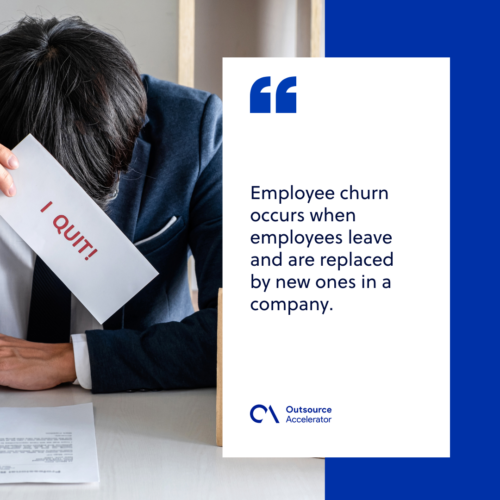10 ways to reduce employee churn

Businesses require workers who are capable of getting the job done. However, successful firms do not set aside their employees. They prioritize them and spend a lot of budgets to keep their employees.
A caring culture fosters mutual trust and a work atmosphere that is conducive to achievement. When employees feel that the organization values their efforts, they’ll be more willing to contribute their ideas.
A healthy working relationship between the management and employees will always lead to more effective strategies for success.
What is employee churn?
Employee churn occurs when employees leave and are replaced by new ones in a company. Attrition and turnover of employees are included in employee churn.
To identify the employee churn, you have to calculate the employee churn rate.
Employee churn rate measures how many people leave a company in a certain period. Reasons for leaving the company can be either voluntary or involuntary, depending on the circumstances. These metrics are frequently presented in percentage.

How do you calculate employee churn rate?
Employee churn rate is the percentage of employees who are leaving the organization. It can be used to demonstrate the company’s exit rate for employees.
Employee churn is measured by taking the percent of employees who leave an organization during a given period and multiplying it by the number of employed employees. Employee churn rate is often calculated every month.
Why is it important to monitor employee churn?
Employee churn is crucial to understand since it has a significant impact on the company. Employee churn affects productivity, business performance, and growth. Therefore, employers must keep an eye on it.
A high employee churn rate has a variety of effects on a business. It limits a company since it creates a workforce constantly made up of individuals with less experience.
Employee churn rate that is exceptionally high may be a sign of issues inside the organization. When employee churn is uncontrollably high, the company is forced to spend more budget for recruiting, hiring, and training.
Tips to avoid employee churn
Managing employee churn is a challenge for many organizations. Here are some valuable tips to keep your employees and avoid turnovers.
1. Hire culture fit employees
The easiest method to avoid losing employees is to hire the right employees in the first place. Establish a clear job description that you and potential employees understand.
You should also verify whether or not the candidate is a good fit for your company’s overall culture.
2. Practice gratitude inside the workplace
When someone expresses gratitude, they show appreciation for whatever they have received, whether it is something material or nonmaterial. Gratitude acknowledges the positive aspects of life.
Encourage your staff to be kind and helpful to one another. Employees will be happier and less likely to leave their positions if they interact and express gratitude to one another.
When employees get burnout, all it takes is a word of appreciation to recharge. Encourage employees to look for positive behaviors to feel that they always belong in the firm.
3. Organize team-building activities
Fostering good relationships among coworkers increases productivity and boosts employee morale. Organizations that prioritize employee retention must place great significance on their employees’ interpersonal interactions.
To foster a cohesive workplace culture, managers should organize team-building activities. Well-coordinated teams have better communication, and are generally more productive.
Aside from monthly team-buildings, team leaders can also organize informal meetings weekly. It will guarantee that new employees are well integrated into the firm and team.
4. Allow flexible working hours
Employee satisfaction is dependent on being able to handle an excellent work-life balance. Giving employees the flexibility to work flexible hours makes them more focused, which leads to higher productivity.
Flexibility in working hours and schedule has been linked to employee satisfaction. Companies will surely succeed from the employees when they prioritize them.
5. Show appreciation for hard work by rewarding employees
Show your staff how much you cherish and appreciate them by rewarding them for their accomplishments and efforts.
An essential factor in preventing losing employees is keeping them satisfied. And there are many ways to reward your employees. Spending money on teaching someone who would later quit you because they feel unappreciated is a waste both for you and them.
6. Develop and implement training programs for employees
Training and development initiatives demonstrate the company’s dedication and sincerity to its employees.
Managers will gain a better understanding of the employees as they conduct training programs. Because of this, they can motivate employees to keep learning and refine their skills at work.

7. Provide quality feedback
Regularly providing positive feedback to employees helps them see things from the perspective of the employer. They’ll stay longer if they believe their superiors are interested in their professional development.
Here are some tips on providing feedback:
- Keep your emotions under control when discussing an issue. Pay attention to the action, not the person.
- Make sure you know exactly why you’re providing the feedback before you give it.
- Help your employees feel comfortable enough to ask for feedback so they can take charge of the conversation.
- Feedback for your employees should be precise, solutions-oriented, and concise.
8. Place more value on employee well-being
The well-being of employees has a positive impact on the company’s performance. When employees are well, they behave better and make better decisions.
Employee happiness has a direct impact on job satisfaction, work absences, and retention. Investing in your employees’ happiness pays off as it improves the employees’ engagement and productivity.
9. Monitor employees who are causing problems
Toxic workers can affect the productivity of the whole team. The most common signs of problematic employees are: being constantly critical of their superiors, fast to point fingers at others, and quick to spread rumors about their shortcomings.
The ability to recognize toxic employees may be challenging, but it is vital. Once you find out who is making trouble inside the team, check if other members are also having issues with that person’s toxic coworker.
This way, you can deal with the problem before it gets out of hand.
Trust within colleagues and leaders can improve employee engagement, well-being, and the quality of work at the company.
10. Improve employee engagement
It’s crucial to monitor employee engagement at all times. When employees feel that they belong to the organization, they are less likely to leave.
Team-building and yearly business outings are some of the activities that can improve employee engagement.
However, employee engagement is more influenced by the relationship between the employee and the supervisor. When employees are more engaged, they have a goal to work toward and a reason to be inspired.







 Independent
Independent




